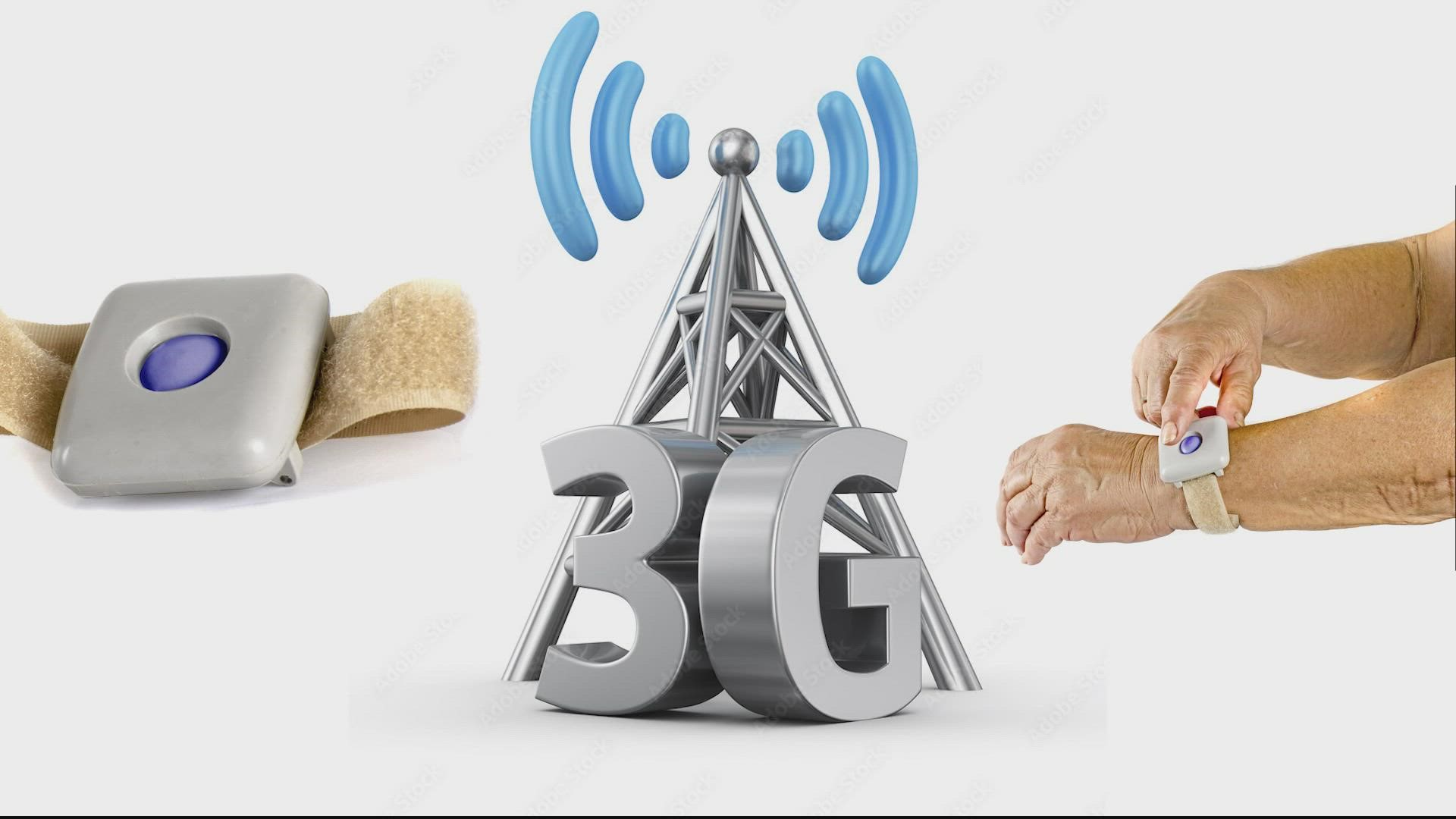MONTGOMERY COUNTY, Md. — They’re called Personal Emergency Response Systems, think of those “Help I've fallen and can't get up!" devices your loved one might have.
Many of these mobile PERS devices and other devices use 3G wireless mobile technology to communicate and pass signals.
Wireless carriers like AT&T, Verizon and T-Mobile are completely shutting down their older networks to make room and free up spectrum for 5G which, according to the CTIA is "...23x more spectrally efficient and up to 156,000x faster than 2G."
When carriers sunset their 2G and 3G networks, many older devices that connect to those wireless networks will go dark.
According to industry experts, millions of medical alert devices, older fire and burglar alarms, crash prevention systems in cars, breathalyzers, ankle monitors, sensors that track school buses, older tablets and smartwatches may not work. Some new tech like EV charging stations operating on older networks could also be impacted.
Jill Myers' mother Elaine is 90 years old and lives alone in Montgomery County, Maryland. She says her mother is independent but has fallen a couple of times so she bought a mobile personal emergency safety device to help keep Elaine safe.


Myers said, "It provides me comfort knowing that it’s not going to be one of those, as you say, ‘I’ve fallen but I can’t get up’ [situations] and she doesn’t have access to anybody.
Here’s the shared concern about the 5G switch: When a senior like Elaine has an emergency, she presses a button on her device. That device sends a signal to a base station in the house. That base station makes a call to a monitoring service or emergency responders and it must connect to a 3G antenna on a cell tower to do it.
However, when cell companies turn off 3G in favor of 5G, that call will go nowhere, leaving anyone who needs help hanging.
Tom Kamber is the executive director of the Older Adult Technology Services from AARP and he said this could be a life or death situation for many elderly people.
Kamber said, "We’re talking about are life-saving devices. We’re not talking about somebody’s stereo speakers switching out on them while they’re listening to a Beatles record." He added, "This is a situation where these devices are designed to save lives."
These network upgrades have been in the works for years. And according to the FCC, each carrier has a different deadline for sunsetting.
Planned Phase-Out of 3G
Daniel Oppenheim is the president of the Medical Alert Monitoring Association and he acknowledges the industry has had three years to upgrade systems. While normally that would have been plenty of time, the pandemic and supply chain issues have bogged things down.
"When companies were able, and seniors were more comfortable letting people into their home, we were not able to get devices because of the supply chain," Oppenheim said. "So it's been very difficult for these companies to even get products to be able to swap out and work with their customers to get them to 4G or 5G before this deadline," Oppenheim said.
Both the industry and safety advocates are asking companies to delay the shutdown of the 3G network.
At this point, the industry experts who spoke with WUSA9 said it's unclear just how many people are using these devices that haven't been upgraded, but they estimate that number is in the millions.
WUSA9 asked AT&T to provide hard numbers on how much of its traffic still runs on 3G, but the company declined.
An AT&T spokesperson said, “For the last three years, careful planning and coordinated work with our customers has gone into the transition to 5G. Forcing a delay would needlessly waste valuable spectrum resources and degrade network performance for millions of our customers.”
But Kamber says there’s more at stake here.
"A PERS button is called a Personal Emergency Response System for a reason because it’s needed for emergencies and frankly if one person listens to this broadcast and finds out that their PERS system is outdated, you know, we could be saving a life here."
The Wireless Association told WUSA9, “Thanks to billions of dollars of investment by the wireless industry, more than 99% of Americans have access to three or more 4G/LTE networks, and 5G networks are coming online for more communities across the country every day."
It added, "Wireless providers have successfully transitioned customers from old to new generations before, and the same consumer-focused transition is happening right now. 3G customers should reach out to their providers to find out more information and discuss options.”
We also reached out to the Federal Communications Commission, the agency that regulates this industry. An FCC spokesperson told us, “We take such concerns seriously and continue to engage with carriers on their plans."

